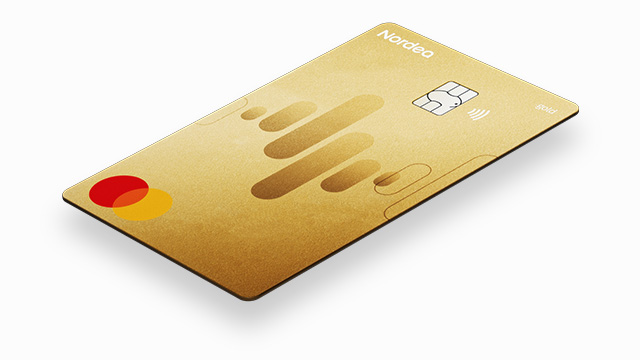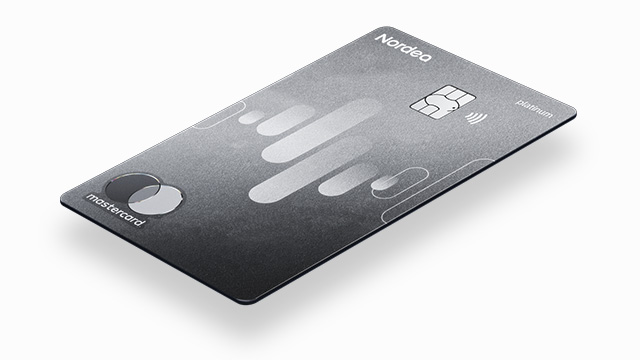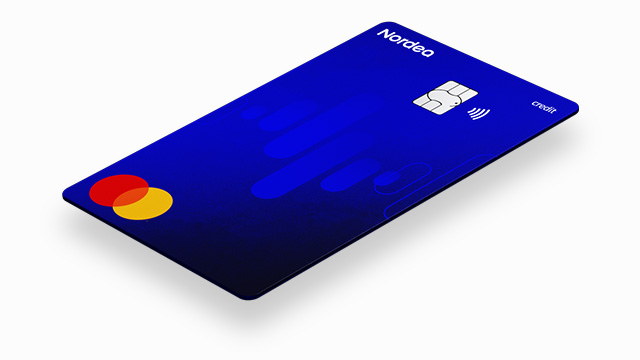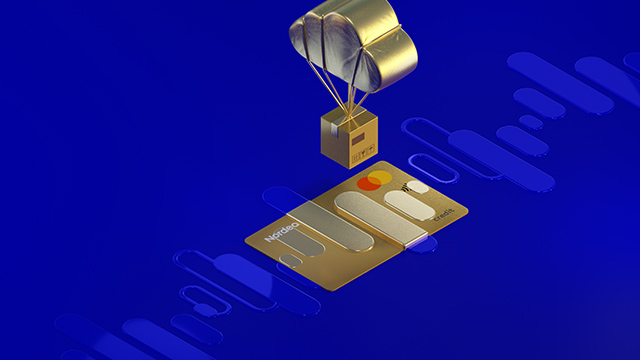Nordea Gold
With a Nordea Gold credit card, the actual annual percentage rate of charge for an outstanding credit balance of 1,500 euros is 12,52% when the 3-month Euribor reference rate is 2,36% (04/2025), the monthly account management fee is 4.50 euros, the customer has opted for the free e-invoice and repays the credit in 12 monthly instalments (139 euros). The estimated total cost of the credit is 1,598 euros. The calculation assumes that the customer has a Mobile Plus or Basic package and therefore gets the card with no monthly or annual fee. Nordea Gold Mastercard is an international charge and credit card and a continuous credit facility which is valid until further notice. The creditor is Nordea Bank Abp, Satamaradankatu 5, Helsinki, or Nordea Finance Finland Ltd, Aleksis Kiven katu 9, Helsinki.
Nordea Credit
With a Nordea Credit credit card, the actual annual percentage rate of charge for an outstanding credit balance of 1,500 euros is 13,64 % when the 3-month Euribor reference rate is 2,36 % (04/2025), the monthly account management fee is 4.50 euros, the customer has opted for the free e-invoice and repays the credit in 12 monthly instalments (140 euros). The estimated total cost of the credit is 1,606.50 euros. The calculation assumes that the customer has a Mobile Plus or Basic package and therefore gets the card with no monthly or annual fee. Nordea Credit Mastercard is an international charge and credit card and a continuous credit facility which is valid until further notice. The creditor is Nordea Bank Abp, Satamaradankatu 5, Helsinki, or Nordea Finance Finland Ltd, Aleksis Kiven katu 9, Helsinki.
Nordea Premium
With a Nordea Premium credit card, the actual annual percentage rate of charge for an outstanding credit balance of 1,500 euros is 30,16 % when the 3-month Euribor reference rate is 2,36 % (04/2025), the monthly account management fee is 4.50 euros, the annual fee for the principal card is 90 euros, the customer has opted for the free e-invoice and repays the credit in 12 monthly instalments (145 euros). The estimated total cost of the credit is 1,725 euros. Nordea Premium Mastercard is an international charge and credit card and a continuous credit facility which is valid until further notice. The creditor is Nordea Bank Abp, Satamaradankatu 5, Helsinki, or Nordea Finance Finland Ltd, Aleksis Kiven katu 9, Helsinki.
Tuohi Mastercard
TUOHI Mastercard is an international charge and credit card. The annual percentage rate of charge on 1,500 euros of outstanding credit is 31,17 %, and the price of credit is 1,732 euros, when the nominal interest is the 3-month Euribor (04/2025) + 14 % and the monthly account management fee of 5 euros and the paper invoice fee of 3 euros have been taken into account. Tuohi is a continuous credit facility which is valid until further notice, with a credit limit of 2,000–10,000 euros. The credit is granted by Nordea Finance Finland Ltd, Aleksis Kiven katu 9, Helsinki.
Stockmann Mastercard
Stockmann Mastercard is an international charge and credit card. The annual percentage rate of charge on 1,500 euros of outstanding credit is 22,5% and the price of credit is 1,671 euros, when the nominal interest rate is the 3-month Euribor (04/2025) + 12.5% and the monthly account management fee of 4 euros have been taken into account. Stockmann Mastercard is a continuous credit facility which is valid until further notice, with a credit limit of 1,500–10,000 euros. The credit is granted by Nordea Finance Finland Ltd, Aleksis Kiven katu 9, Helsinki.
Yes. You can get a Nordea Gold credit card if you study in a higher education institution, such as a university or university of applied sciences.
You can apply for Nordea Gold as soon as you have been admitted to study. You don’t need to have any course credits or a regular income. Your student benefits will remain in force for as long as you study.
Your student credit card can provide you with a credit limit of up to 2,000 euros. In addition, Nordea Gold comes with international travel insurance as well as Product Safety Insurance, which protects items you purchase for your home.
Nordea Gold has no monthly fee for students as long as you have one of our daily banking packages.
Read more about credit cards for students
When you pay with a credit card, your purchases are charged to a credit account. We offer a 30-day interest-free payment period on average with no extra charges for all purchases made with a credit card. We’ll send you an invoice once a month at the end of the invoicing period detailing the purchases you have made. You can then decide if you want to make the agreed minimum payment or pay off your full credit card balance – or something in between. If you decide to leave part of the balance unpaid, you will pay interest on the remaining balance as determined in the card terms and conditions.
All your credit card benefits, including insurance, apply when you make purchases using the credit facility of your card. The benefits will remain valid even if you pay off the entire balance after your purchase.
When you pay with a debit card, your purchases are charged to your bank account.
Most of our credit cards are combination cards, enabling you to use them as both credit and debit cards. When you pay with your card’s credit facility, the transaction is charged to your credit account. When you pay with the debit card, the transaction is charged to your bank account.
Read more about the differences between credit and debit cards
.svg)





